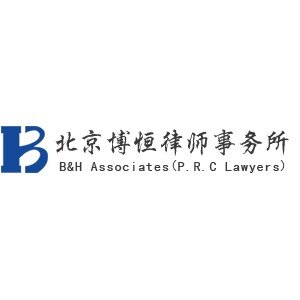Best International Trade Law Lawyers in Beijing
Share your needs with us, get contacted by law firms.
Free. Takes 2 min.
List of the best lawyers in Beijing, China
About International Trade Law in Beijing, China
International Trade Law in Beijing, as part of global commerce, involves a complex array of regulations and agreements that govern trade relationships between China and other countries. This legal field encompasses a wide range of issues, including import and export regulations, trade agreements, tariffs, and disputes. Beijing, being the political and economic center of China, plays a significant role in shaping and implementing international trade policies and regulations. The city's legal landscape is influenced by both national regulations and regional policies that encourage and manage international trade.
Why You May Need a Lawyer
Engaging with international trade in Beijing can involve numerous challenges and legal complexities. You might need a lawyer for various reasons, including:
- Understanding and complying with Chinese import and export regulations.
- Negotiating and drafting international trade agreements.
- Resolving disputes related to trade contracts or due to unfair trade practices.
- Advising on tariff classifications and appealing customs decisions.
- Navigating issues related to international investment and trade compliance.
- Handling anti-dumping and countervailing duty investigations.
- Addressing issues arising from trade embargoes or sanctions.
Local Laws Overview
International Trade Law in Beijing is subject to the national laws of China as well as international agreements to which China is a signatory. Key aspects include:
- Customs Law: Governs the import and export of goods, including duties and inspection processes.
- Foreign Trade Law: Provides the framework for international trade practices and policies.
- Contract Law: Critical for drafting and enforcing trade agreements and contracts.
- Intellectual Property Rights: Includes laws regulating patents, trademarks, and copyrights within trade contexts.
- Dispute Resolution Mechanisms: Involves using local courts or arbitration for resolving trade disputes.
Frequently Asked Questions
What is the role of a trade lawyer in Beijing?
A trade lawyer assists with navigating trade regulations, ensuring compliance, drafting bilateral agreements, and providing representation in legal disputes.
How does the Chinese government regulate international trade?
The Chinese government regulates international trade through comprehensive laws, including the Foreign Trade Law and various sector-specific regulations and policies.
Can I participate in international trade without a lawyer?
While it's possible to engage in international trade without a lawyer, having legal counsel can help prevent costly mistakes and ensure compliance.
What should I consider when drafting an international trade contract?
Considerations include terms of delivery, payment, obligations, dispute resolution, and the applicable law governing the contract.
How can I resolve a trade dispute in Beijing?
Trade disputes can be resolved through negotiation, mediation, arbitration, or litigation, depending on the contract terms and nature of the dispute.
What are China's customs procedures for importing goods?
China’s customs procedures involve declaration, documentation, duties payment, inspection, and clearance. Compliance with these procedures is crucial.
Are there any restrictions on foreign companies trading in China?
Yes, there are restrictions and policies aimed at different sectors, requiring foreign companies to comply with specific legal and regulatory frameworks.
How can tariffs affect my business in China?
Tariffs impact the cost of goods, which can affect pricing, competitiveness, and profitability in the Chinese market.
What are the penalties for non-compliance with trade laws in China?
Penalties can range from fines to the revocation of trading licenses and include legal sanctions depending on the violation’s severity.
How do international sanctions affect trade with China?
Sanctions can restrict the ability to trade certain goods and services with China, requiring businesses to stay informed about current international regulations.
Additional Resources
For further guidance and resources related to International Trade Law in Beijing, consider the following organizations and bodies:
- Ministry of Commerce of the People's Republic of China (MOFCOM)
- General Administration of Customs of the People's Republic of China (GACC)
- China Council for the Promotion of International Trade (CCPIT)
- Beijing Arbitration Commission for dispute resolution services
- The International Trade Commission (ITC) in China
- Legal publications and databases for updated trade regulations
Next Steps
If you need legal assistance with International Trade Law in Beijing, consider the following steps:
- Identify your specific legal needs related to trade activities.
- Research and contact qualified international trade lawyers in Beijing.
- Prepare relevant documents and records for consultation.
- Discuss your situation and legal options with the lawyer.
- Negotiate terms of engagement, including services and fees.
- Follow legal advice and strategies provided by the lawyer to address your trade issues.
Lawzana helps you find the best lawyers and law firms in Beijing through a curated and pre-screened list of qualified legal professionals. Our platform offers rankings and detailed profiles of attorneys and law firms, allowing you to compare based on practice areas, including International Trade Law, experience, and client feedback.
Each profile includes a description of the firm's areas of practice, client reviews, team members and partners, year of establishment, spoken languages, office locations, contact information, social media presence, and any published articles or resources. Most firms on our platform speak English and are experienced in both local and international legal matters.
Get a quote from top-rated law firms in Beijing, China — quickly, securely, and without unnecessary hassle.
Disclaimer:
The information provided on this page is for general informational purposes only and does not constitute legal advice. While we strive to ensure the accuracy and relevance of the content, legal information may change over time, and interpretations of the law can vary. You should always consult with a qualified legal professional for advice specific to your situation.
We disclaim all liability for actions taken or not taken based on the content of this page. If you believe any information is incorrect or outdated, please contact us, and we will review and update it where appropriate.














